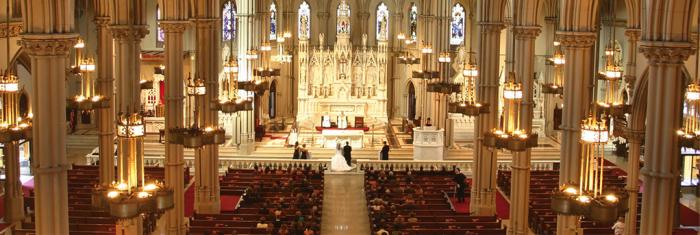
4.21 Навіщо вибирати целібат, якщо люди створені для шлюбу?
Шлюб і безшлюбність — це два способи, за допомогою яких християнин може виконувати Божу заповідь бути плідними (Буття 1:28) Буття 1:28: І поблагословив їх Бог, і сказав Бог до них: «Плодіться й розмножуйтеся, і наповнюйте землю, оволодійте нею, і пануйте над морськими рибами, і над птаством небесним, і над кожним плазуючим живим на землі!».. У шлюбі чоловік і жінка присвячують себе один одному в любові. У безшлюбності хтось присвячує себе тільки Божій любові, не маючи статевих стосунків.
Завдяки цій прихильності людина в безшлюбності готова робити те, чого від неї вимагає Бог, будь-коли та будь-де. Релігійні отці, брати та сестри, які присвятили себе Богові, знаходять у своєму житті справжнє щастя. Можна вважати це передчуттям раю, де більше ніхто не буде одружуватися.
How are the people of God formed?
Among the faithful by divine institution there exist sacred ministers who have received the sacrament of Holy Orders and who form the hierarchy of the Church. The other members of the Church are called the laity. In both the hierarchy and the laity there are certain of the faithful who are consecrated in a special manner to God by the profession of the evangelical counsels: chastity or celibacy, poverty, and obedience. [CCCC 178]
What is the consecrated life?
The consecrated life is a state of life recognized by the Church. It is a free response to a special call from Christ by which those consecrated give themselves completely to God and strive for the perfection of charity moved by the Holy Spirit. This consecration is characterized by the practice of the evangelical counsels. [CCCC 192]
What can the consecrated life give to the mission of the Church?
The consecrated life participates in the mission of the Church by means of a complete dedication to Christ and to one’s brothers and sisters witnessing to the hope of the heavenly Kingdom. [CCCC 193]
Is it necessary to be celibate to receive the sacrament of Holy Orders?
It is always necessary to be celibate for the episcopacy. For the priesthood in the Latin Church men who are practicing Catholics and celibate are chosen, men who intend to continue to live a celibate life “for the kingdom of heaven” (Matthew 19:12). In the Eastern Churches marriage is not permitted after one has been ordained. Married men can be ordained to the permanent diaconate. [CCCC 334]
How is the one, holy, catholic, and apostolic Church structured?
In the Church there are the laity and clerics (clergy). As children of God, they are of equal dignity. They have equally important but different tasks. The mission of the laity is to direct the whole world toward the kingdom of God. In addition, there are the ordained ministers (clerics), who have the duties of ecclesiastical governance, teaching, and sanctification. In both states of life, there are Christians who place themselves at God’s disposal in a special way through celibacy, poverty, and obedience (for example, consecrated religious).
Every Christian has the duty to bear witness to the Gospel by his own life. But God walks a special path with each person. Some he sends as laymen, so that they might build up the kingdom of God by their family and occupation in the midst of the world. For this purpose, he bestows on them in Baptism and Confirmation all the necessary gifts of the Holy Spirit. Others he entrusts with the pastoral ministry; they are to govern, teach, and sanctify his people. No one can take this duty upon himself; the lord himself must send him on his way with his divine power through holy Orders, so that he can act in the place of Christ and administer the sacraments. [Youcat 138]
Why does Jesus want there to be Christians who live their whole lives in poverty, unmarried chastity, and obedience?
God is love. He longs for our love also. One form of loving surrender to God is to live as Jesus did—poor, chaste, and obedient. Someone who lives in this way has head, heart, and hands free for God and neighbor.
In every age individual Christians let themselves be completely taken over by Jesus, so that “for the sake of the kingdom of heaven” (Mt 19:12) they give everything away for God—even such wonderful gifts as their own property, self-determination, and married love. This life according to the evangelical counsels in poverty, chastity, and obedience shows all Christians that the world is not everything. Only an encounter with the divine Bridegroom “face to face” will ultimately make a person happy. [Youcat 145]
Why does the Church require priests and bishops to live a celibate life?
Jesus lived as a celibate and in this way intended to show his undivided love for God the Father. To follow Jesus’ way of life and to live in unmarried chastity “for the sake of the kingdom of heaven” (Mt 19:12) has been since Jesus’ time a sign of love, of undivided devotion to the Lord, and of a complete willingness to serve. The Roman Catholic Church requires this way of life of its bishops and priests, while the Eastern Catholic Churches demand it only of their bishops.
Celibacy, says Pope Benedict, cannot mean “remaining empty in love, but rather must mean allowing oneself to be overcome by a passion for God”. A priest who lives as a celibate should be fruitful inasmuch as he represents the fatherly character of God and Jesus. The Pope goes on to say, “Christ needs priests who are mature and manly, capable of exercising a true spiritual fatherhood.” [Youcat 258]
Скажіть моїм братам в ім’я Ісуса Христа, щоб вони любили своїх дружин, як Господь любить Церкву. Якщо хтось може вистояти в цнотливості на честь тіла Господнього, нехай робить це з усією покорою... Нехай все буде на славу Божу. [св. Ігнатій Антіохійський, Послання до св. Полікарпа (MG 5, 724)]





